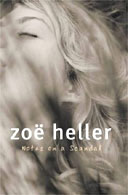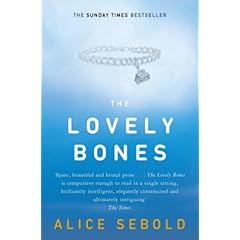 I apologise for my thoughts on this book at the very outset. I'm going through a bit of a stressful phase right now, and while normally, it doesn't affect the way I approach books, I'm not completely convinced that it hasn't this time 'round. I mean, The Long Song was longlisted for the Orange Prize, and it's on the Booker longlist as well. It's got to be a good book, right?
Well, I didn't finish it, and it wasn't for lack of trying! I put it aside at 150 pages - my edition had 308 pages, so I did read about half of the book, and it failed to engage me at any level. Strange, because the subject matter is intense and well, more often than not, I end up empathising and sympathising with the protagonists and narrators of such stories. This time - absolutely nothing.
I apologise for my thoughts on this book at the very outset. I'm going through a bit of a stressful phase right now, and while normally, it doesn't affect the way I approach books, I'm not completely convinced that it hasn't this time 'round. I mean, The Long Song was longlisted for the Orange Prize, and it's on the Booker longlist as well. It's got to be a good book, right?
Well, I didn't finish it, and it wasn't for lack of trying! I put it aside at 150 pages - my edition had 308 pages, so I did read about half of the book, and it failed to engage me at any level. Strange, because the subject matter is intense and well, more often than not, I end up empathising and sympathising with the protagonists and narrators of such stories. This time - absolutely nothing.
Set in the early nineteenth century, this book focuses on the final days of slavery in Jamaica. The primary voice is that of July, a slave born on the sugar plantation called Amity, after her mother was raped by the overseer of the plantation. July was separated from her mother, Kitty, when the plantation owner's sister, Caroline, found her utterly charming and wanted to groom her to be a lady's maid. Caroline, new to Jamaica and the rampant slavery, depended much on July, and the slave girl often took advantage of her mistress' dependence.
Personally, I thought that the writing lacked the intensity that the subject matter deserves, and almost treated the subject frivolously. I also did cringe, occasionally, on reading some of the lines, although I'm willing to bet that Levy intended to have that effect on the reader.
"Stuff up her mouth with rags, come on, come on," he insisted once more. Rose took a rag, dipping it in the water from the pail and brushed it against Kitty's lips. But Tam Dewar, exhaling with annoyance, commanded, "Not like that!" He snatched at the rag that Rose held, then forced the damp cloth down into Kitty's mouth. "Like this, you fool, like this."
Rose protested, "Massa, she birthin', she birthin'!" as Kitty choked to accommodate the bulk of cloth in her mouth.
I don't think I got used to the style of writing either, where the narrator constantly addressed me as "Reader," and it switched between first person (present) and third person (past). And, I really didn't care what happened to the characters - who survived, who didn't.
Maybe I'm being harsh, but despite the writing being simple, I found reading this book a chore, and didn't feel inclined to pick it up. I wish I'd finished this book, to see what the end objective was - and maybe, just maybe, the second half of the book would end up redeeming itself. Have you read this book? Do you think the second half is better/more engrossing than the first?
Have you read Levy's Small Island? I think it's her most talked about book. Would you recommend that over her latest?
 I finished this book over two weeks ago, and have been struggling to write the review ever since. I honestly hoped I wouldn't have to drag it into the new year, but there you have it...
This is the first Toni Morrison I've read, and I started the book with great trepidation. I've heard phenomenal things about Toni Morrison, and I was intimidated... unsure of what to expect. I really hoped I'd enjoy the book, and it would make me go out and buy more books by Morrison instantaneously, but unfortunately, I was left feeling fairly indifferent. I didn't like the book. I didn't dislike the book... and I'm not accustomed to having that kind of a reaction to a book - especially as I've mulled over it for about two weeks!
I finished this book over two weeks ago, and have been struggling to write the review ever since. I honestly hoped I wouldn't have to drag it into the new year, but there you have it...
This is the first Toni Morrison I've read, and I started the book with great trepidation. I've heard phenomenal things about Toni Morrison, and I was intimidated... unsure of what to expect. I really hoped I'd enjoy the book, and it would make me go out and buy more books by Morrison instantaneously, but unfortunately, I was left feeling fairly indifferent. I didn't like the book. I didn't dislike the book... and I'm not accustomed to having that kind of a reaction to a book - especially as I've mulled over it for about two weeks! Contrary to popular opinion, I thought this book just wasn't all that. I know many people who have this book on their "best of" lists, and it's supposed to be amazing. And there are parts of it which are... specially the premise:
Henry suffers from a genetic disorder, which allows him to time-travel, albeit the time-traveling isn't done at his will, but can happen anytime, with no heads up whatsoever. So, at the age of thirty-six, he goes back in time to meet Clare. the love of his life, who is six, but, in real terms, she is only eight years younger than him!
Contrary to popular opinion, I thought this book just wasn't all that. I know many people who have this book on their "best of" lists, and it's supposed to be amazing. And there are parts of it which are... specially the premise:
Henry suffers from a genetic disorder, which allows him to time-travel, albeit the time-traveling isn't done at his will, but can happen anytime, with no heads up whatsoever. So, at the age of thirty-six, he goes back in time to meet Clare. the love of his life, who is six, but, in real terms, she is only eight years younger than him! Catherine O' Flynn's much acclaimed debut novel probably has one of the most fascinating opening chapters I've ever read, which revolves around Kate Meaney, a ten year old aspiring detective. Following Kate, and her 'partner' Mickey (a soft toy), through her 'stakeouts' as she looks for 'suspicious' people, simultaneously trying to determine their possible motives, her friendship with Adrian, the neighbor's twenty-two year old son, her friends at school, and her life with her dad, the book comes across as an innocent feel-good book.
Catherine O' Flynn's much acclaimed debut novel probably has one of the most fascinating opening chapters I've ever read, which revolves around Kate Meaney, a ten year old aspiring detective. Following Kate, and her 'partner' Mickey (a soft toy), through her 'stakeouts' as she looks for 'suspicious' people, simultaneously trying to determine their possible motives, her friendship with Adrian, the neighbor's twenty-two year old son, her friends at school, and her life with her dad, the book comes across as an innocent feel-good book. I'm trying to read all the Booker winners, in the next couple of years. This painstakingly dull book, filled with unengaging characters and a pointless plot adds a serious blemish to my plan at the very outset. I struggled through the first thirty pages, and struggled some more 'til I hit page 89, in a week... And then... then I just gave up, and figured this book is not for me. I mean, what a gigantic waste of my reading time!
I'm trying to read all the Booker winners, in the next couple of years. This painstakingly dull book, filled with unengaging characters and a pointless plot adds a serious blemish to my plan at the very outset. I struggled through the first thirty pages, and struggled some more 'til I hit page 89, in a week... And then... then I just gave up, and figured this book is not for me. I mean, what a gigantic waste of my reading time!  Who doesn't love a good juicy scandal? The type that makes its way to the tabloids, and has everyone talking about it, and judging the protagonists of the impropriety. Everyone has an opinion, and more oft' than not, it's judging the miscreants. Society. Business as usual.
Who doesn't love a good juicy scandal? The type that makes its way to the tabloids, and has everyone talking about it, and judging the protagonists of the impropriety. Everyone has an opinion, and more oft' than not, it's judging the miscreants. Society. Business as usual.  This is Sebold’s debut novel, and while there’s lots of loopholes in the story, the premise in itself is interesting.
This is Sebold’s debut novel, and while there’s lots of loopholes in the story, the premise in itself is interesting.